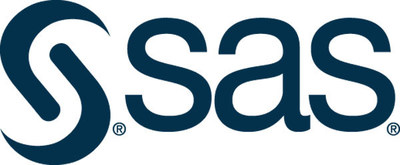Anti-money laundering pros find expanding uses for AI. But adoption remains slow.
Global ACAMS survey by SAS and KPMG reflects that AI and ML integration is on the way – but won't happen overnight
CARY, N.C., Feb. 25, 2025 /PRNewswire/ -- Using AI technology in anti-money laundering (AML) processes has become critical for financial institutions as they work to comply with regulations and combat financial crime. Even so, a new AML technology study from data and AI leader SAS, featuring contributions from SAS Partner KPMG, finds that interest in AI continues to outpace its full implementation. Based on a global survey of 850 members of the Association of Certified Anti-Money Laundering Specialists (ACAMS), the study reveals:
- Adoption of AI and machine learning (ML) remains modest. Only 18% of survey respondents report having AI/ML solutions in production. Another 18% are piloting AI/ML solutions, while 25% plan to implement AI/ML in the next 12-18 months; 40% have no current plans to adopt AI/ML.
- Interest in generative AI technology is robust but seemingly cautious. Nearly half of respondents say they are currently piloting GenAI (10%) or are in the discovery phase (35%) – no small amount for an emerging technology. Still, that leaves 55% with no plans to adopt GenAI.
The road to integration: The state of AI and machine learning adoption in anti-money laundering compliance, a follow-up to a similar survey published in 2021, explores the current state of AI/ML adoption for anti-money laundering. SAS has also published a data dashboard that allows users to explore, visualize and filter survey insights by region and institution size.
"The survey indicates that AML practitioners believe regulators have cooled on AI," said Kieran Beer, Chief Analyst and Director of Editorial Content at ACAMS. "Fifty-one percent said their regulator promotes or encourages AI/ML innovation – a 15-point drop from 2021. Those who said regulators are apprehensive or cautious about AI/ML adoption rose from 28% to 36%, and those describing regulators as 'resistant to change' more than doubled from 6% to 13%."
"AI and machine learning aren't a magic fix for every financial crimes challenge. But they are showing to be increasingly effective in certain areas – especially those involving large amounts of data," said Timo Purkott, Global Fraud and Financial Crime Transformation Lead at KPMG International and Partner at KPMG in Germany. "That includes automating alerts from transaction monitoring, generating enterprise wide risk assessments, reporting suspicious activities, AML checks, striving to reduce false positives and more. It all depends on data. Organizations must invest in their data management infrastructure to maximize the value of AI and ML and stay ahead of financial criminals."
AI and ML are producing value – when fully implemented
The survey produced a number of insights on how AI technology is being used in anti-money laundering and why companies may be slow to fully integrate it into their operations:
Organizations are identifying more uses for AI/ML. In the first edition of the survey in 2021, 78% of respondents cited either improving the quality of investigations and regulatory findings (40%) or reducing false positives (38%) as their primary reason for AI/ML adoption. This year, the answers to that question were more diverse. Those top two answers were still the same, but the combined percentage dropped by 11 points to 67%. Meanwhile, detecting complex risks rose from 17% to 21%, and "none of the above" jumped from 5% to 13%.
Reasons for not adopting AI/ML have also evolved. In 2021, the top obstacle for passing on AI was budget constraints, at 39%. That slipped to 34% in this survey and was overtaken by the lack of a regulatory imperative, up slightly to 37%. Lack of available skills is also becoming less of a concern, with the percentage falling by nearly half to 11%. However, the "Other" category saw a significant rise from 5% to 19%.
Reducing false positives is a growing priority. When asked about their priorities for AI/ML deployment, AML experts cited the reduction of false positives in existing surveillance systems at 38% (an 8% increase since 2021). Automating data enrichment for investigations and due diligence (25%) and detecting new risks with advanced modeling techniques (23%) also remained popular responses, though both dropped by several points from the previous survey. The remaining 13% of respondents cited customer segmentation for behavioral analysis.
Reducing false positives and negatives was also the top answer for which area offers the most value from AI/ML, at 38%. However, the other two available choices – better and faster investigations (34%) and triaging high- and low-risk alerts (28%) – weren't far behind.
Machine learning is making a big impact – but don't sleep on NLP. When asked to rank three technologies based on their impact, machine learning was once again the top choice by far at 58%, up 6% since 2021. Robotic process automation saw a corresponding drop to 28%, while natural language processing (NLP) was the last choice at 14%. While machine learning's ability to identify patterns in large amounts of data is certainly impactful, might the low response for NLP indicate that compliance teams are missing early warning signs due to underdeveloped capabilities?
Laying the groundwork for a competitive advantage
"The key to unlocking the full potential of AI and machine learning is integration of data sources, teams and technology. The first step toward that integration is establishing a data ecosystem that combines data from all sources," said Stu Bradley, Senior Vice President of Risk, Fraud and Compliance Solutions at SAS. "In this ACAMS survey, 86% of respondents reported doing some form of integration between AML, fraud and information security processes. Nearly a third have a fully integrated case management capability across those functions. Another third collaborate through cross-functional teams to deploy controls to prevent financial crimes exposure.
"Some organizations may be waiting on regulatory guidance. Firms that press ahead with integrating data and operations with governance in mind are laying the groundwork for responsible innovation in AI and ML and will enjoy a competitive advantage over those who hesitate."
About ACAMS
ACAMS is a leading international membership organization dedicated to providing opportunities for anti-financial crime education, best practices, and peer-to-peer networking to AFC professionals globally. With over 115,000 members across 200+ jurisdictions and territories, ACAMS is committed to the mission of combatting financial crime through the provision of anti-money laundering/counterterrorism-financing, anti-fraud and sanctions knowledge-sharing, thought leadership, risk-mitigation services, ESG initiatives, and platforms for public-private dialogue. The association's CAMS certification is the gold-standard qualification for AFC professionals. It also offers CGSS certification for sanctions professionals, CCAS certification for AFC practitioners in the crypto space, and CAFS certification for anti-fraud professionals. ACAMS' 60+ Chapters globally further amplify the association's mission through training and networking initiatives. Visit acams.org for more information.
About KPMG International
KPMG is a global organization of independent professional services firms providing Audit, Tax and Advisory services. KPMG is the brand under which the member firms of KPMG International Limited ("KPMG International") operate and provide professional services. "KPMG" is used to refer to individual member firms within the KPMG organization or to one or more member firms collectively. KPMG firms operate in 142 countries and territories with more than 275,000 partners and employees working in member firms around the world. Each KPMG firm is a legally distinct and separate entity and describes itself as such. Each KPMG member firm is responsible for its own obligations and liabilities.
KPMG International Limited is a private English company limited by guarantee. KPMG International Limited and its related entities do not provide services to clients. For more detail about our structure, please visit kpmg.com/governance.
About SAS
SAS is a global leader in data and AI. With SAS software and industry-specific solutions, organizations transform data into trusted decisions. SAS gives you THE POWER TO KNOW®.
SAS and all other SAS Institute Inc. product or service names are registered trademarks or trademarks of SAS Institute Inc. in the USA and other countries. ® indicates USA registration. Other brand and product names are trademarks of their respective companies. Copyright © 2025 SAS Institute Inc. All rights reserved.
Editorial Contacts: | |
Trey Whittenton | Danielle Bates |
Trey.Whittenton@sas.com | Danielle.Bates@sas.com |
919-531-6829 | 919-531-1959 |
sas.com/news |
![]() View original content to download multimedia:https://www.prnewswire.com/news-releases/anti-money-laundering-pros-find-expanding-uses-for-ai-but-adoption-remains-slow-302384474.html
View original content to download multimedia:https://www.prnewswire.com/news-releases/anti-money-laundering-pros-find-expanding-uses-for-ai-but-adoption-remains-slow-302384474.html
SOURCE SAS



